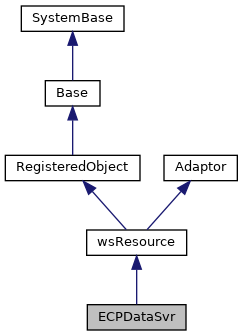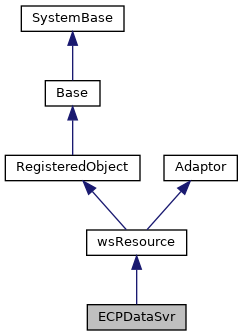This class represents system metrics captured for ECP Data Server activity. More...


Public Attributes | |
| ActConn | |
| Number of current active connections to this Data Server. More... | |
| BigKill | |
| The number of messages sent by the server for big kills. More... | |
| BigString | |
| The number of times the block was not sent to the client because the result was a big string. More... | |
| BlockSent | |
| The number of Blocks sent. More... | |
| ByteRcvd | |
| The number of Bytes received. More... | |
| ByteSent | |
| The number of Bytes sent. More... | |
| GloRef | |
| The number of Global references returned. More... | |
| GloUpdate | |
| The number of global references that updated the database. More... | |
| LockFail | |
| The number of lock requests that immediately fail. More... | |
| LockGrant | |
| The number of lock requests that are immediately granted. More... | |
| LockQue | |
| The number of lock requests that must be queued. More... | |
| LockQueFail | |
| The number of lock requests that are queued and later fail. More... | |
| LockQueGrant | |
| The number of lock requests that are queued and later granted. More... | |
| MaxConn | |
| Maximum possible number of connections to this Data Server. More... | |
| ReqBuff | |
| The number of request buffers processed. More... | |
| ReqRcvd | |
| The number of Requests received. More... | |
| RoutinePurge | |
| The number of messages sent by the server to purge a routine on the client . More... | |
| SvrBlockPurge | |
| The number of blocks the server has requested the client to purge. More... | |
This class represents system metrics captured for ECP Data Server activity.
Each property is a different metric. A class may be instantiated by calling the class method 'Sample', and then the current value of each property can be accessed.
For example:
s ref=##class(SYS.Stats.ECPDataSvr).Sample() w ref.GloRef ; display number of Global References returned by this Data Server
System stats for an ECP Data Server
| ActConn |
Number of current active connections to this Data Server.
| BigKill |
The number of messages sent by the server for big kills.
| BigString |
The number of times the block was not sent to the client because the result was a big string.
| BlockSent |
The number of Blocks sent.
| ByteRcvd |
The number of Bytes received.
| ByteSent |
The number of Bytes sent.
| GloRef |
The number of Global references returned.
| GloUpdate |
The number of global references that updated the database.
| LockFail |
The number of lock requests that immediately fail.
| LockGrant |
The number of lock requests that are immediately granted.
| LockQue |
The number of lock requests that must be queued.
| LockQueFail |
The number of lock requests that are queued and later fail.
| LockQueGrant |
The number of lock requests that are queued and later granted.
| MaxConn |
Maximum possible number of connections to this Data Server.
| ReqBuff |
The number of request buffers processed.
| ReqRcvd |
The number of Requests received.
| RoutinePurge |
The number of messages sent by the server to purge a routine on the client .
| SvrBlockPurge |
The number of blocks the server has requested the client to purge.